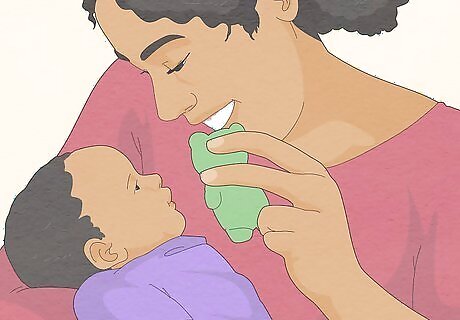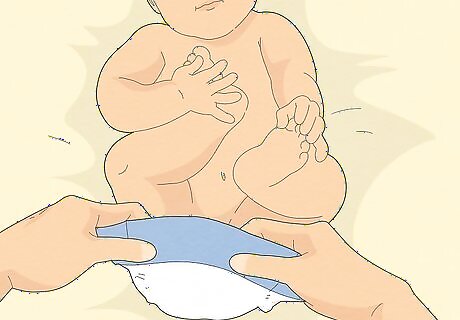
views
- Help your newborn stay awake by playing with them and keeping them engaged.
- Expose a newborn to daylight and keep the lights low at night to get them used to day and night cycles.
- Allow a newborn to get a healthy amount of sleep each day.
- Ask for help taking care of your newborn if you’re feeling exhausted or overwhelmed.
Expose your newborn to natural sunlight.

Sunlight provides great stimulus for a newborn, and helps keep them awake. Getting babies outside also helps your newborn start to recognize daytime versus nighttime, which will aid in establishing healthy sleeping habits. “Stimuli” are anything that might interest or engage a newborn, and are key in making sure they stay up and alert. Try a walk in a stroller, or play in the grass at a park. Avoid exposing your newborn to direct sunlight for extended periods of time.
Play with your newborn if they look sleepy.

You can distract your newborn from sleep with stimuli like toys. Soft touches or engaging them in play encourages them to stay awake and alert, in order to take in this new exciting sensation. Signs of drowsiness in an infant include yawning, rubbing their eyes, grimacing, and clench fists. Peekaboo and playing with a baby’s toes are classic and time-tested methods of play.
Change your newborn’s clothes.

Undressing and redressing your baby is a familiar and stimulating activity. It can make them more awake and alert and also help accustom them to a process you’ll be doing quite a bit for the next several months. Show your newborn each article of clothing, and let them touch and explore each, for added stimulus.
Change your newborn’s diaper.

You can help your newborn stay awake by performing familiar actions. Like changing their clothes, changing your newborn’s diaper is a healthy and natural habit that will make your baby alert and get them used to a necessary routine. While doing this, lift your newborn and play with their legs and feet to keep them engaged.
Give your newborn a bath.

Bathtime doesn’t have to come right before bedtime. Giving your baby a bath with running water, light splashes, and plenty of toys are good ways to engage your baby’s curiosity and distract it from sleep. Gently pour water over your baby’s back and shoulders to introduce a soft but exciting stimulus.
Space out your newborn’s meals.

A full belly helps a newborn fall asleep, so use that to your advantage. One of the best ways to make sure your baby stays up during the day is to get them sleeping more at night. A baby that’s been “snacking” or having light meals or short breastfeeding sessions might not want to eat before bed. Gradually space out your newborn’s feeding times so that you can coordinate a full meal right before bed. If your newborn gets fussy for a snack, try distracting them with toys. Be careful not to neglect your newborn’s needs, and do take care to feed them regularly.
Create a nighttime ritual.

Consistent rituals help ease your baby into a sleeping habit. You can help your newborn get to sleep more easily by creating routines that let them know it’s time for bed, and by getting to bed at a consistent time every night. Sing lullabies or read to your newborn immediately before bed. Giving your baby a massage or introducing calming scents at nighttime are other good rituals.
Keep the lights low at night.

It’s important to help your newborn recognize nighttime. You can encourage sleepiness and establish a nighttime routine by keeping the lights in your home dim, which tells your baby that it’s time to sleep. Turn off any overhead lights, and stick to dim lamps or nightlights when it gets dark outside.
Ask a partner, friend, or relative to help out.

If possible, recruit a helping hand to help yourself get enough rest. Taking care of an infant in shifts is a key strategy to ensure everyone involved gets a good night’s sleep and has enough energy for the next day. Offer to also help out your friends or family where you can, if they need a little convincing. A nanny or a trusted babysitter are great hired alternatives.
Let your baby cry it out at night.

If your baby is fussing , don’t rush to the crib just yet. Crying at night can be the source of much frustration and feelings of helplessness, both for you and your newborn. But letting your baby cry it out can actually teach them that nighttime is for sleeping, not crying. Try this tip once your newborn has reached 3-6 months old, when they’re more developmentally ready for sleep training.
Know that newborns won’t sleep through the night.

Newborns have short sleep cycles they can’t control. As much as we wish they would, we just can’t expect a newborn to get a full 8 hours of sleep like we do. Newborns usually wake 2 to 4 times per night, and will start to sleep in 90-minute cycles at about 3-6 months old. It’s important to keep realistic expectations regarding your baby’s sleep schedule.




















Comments
0 comment